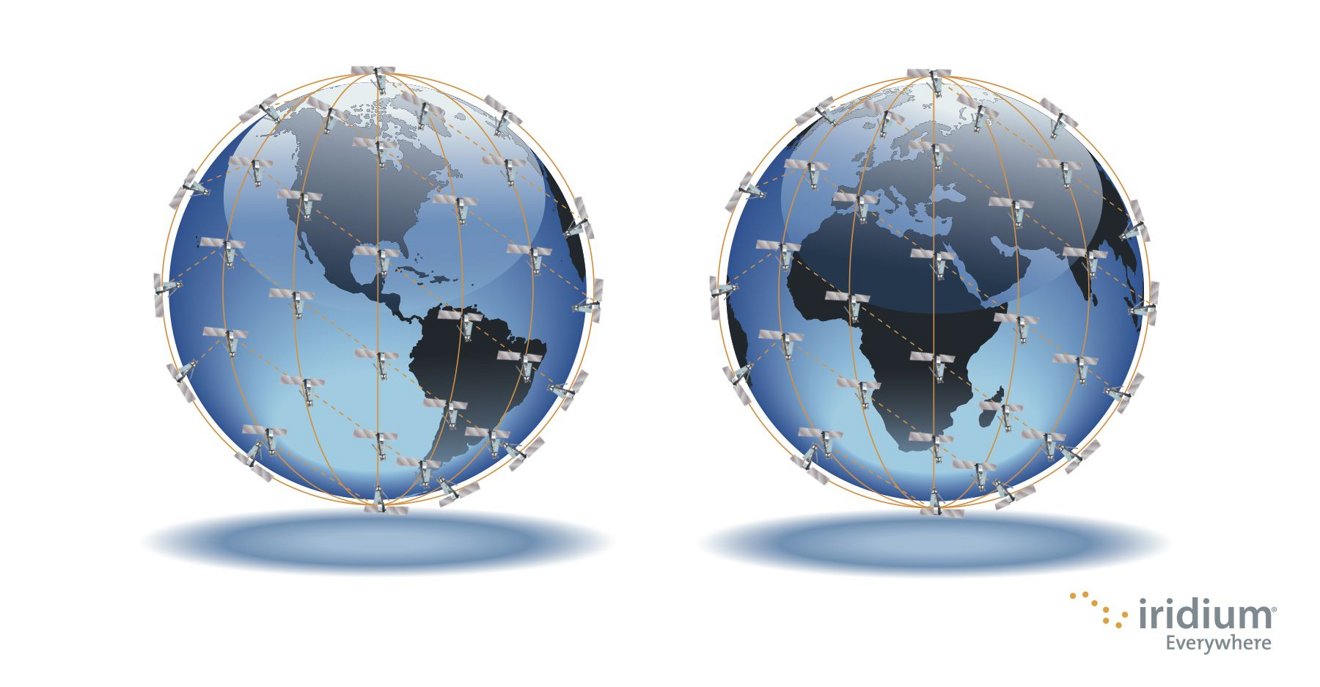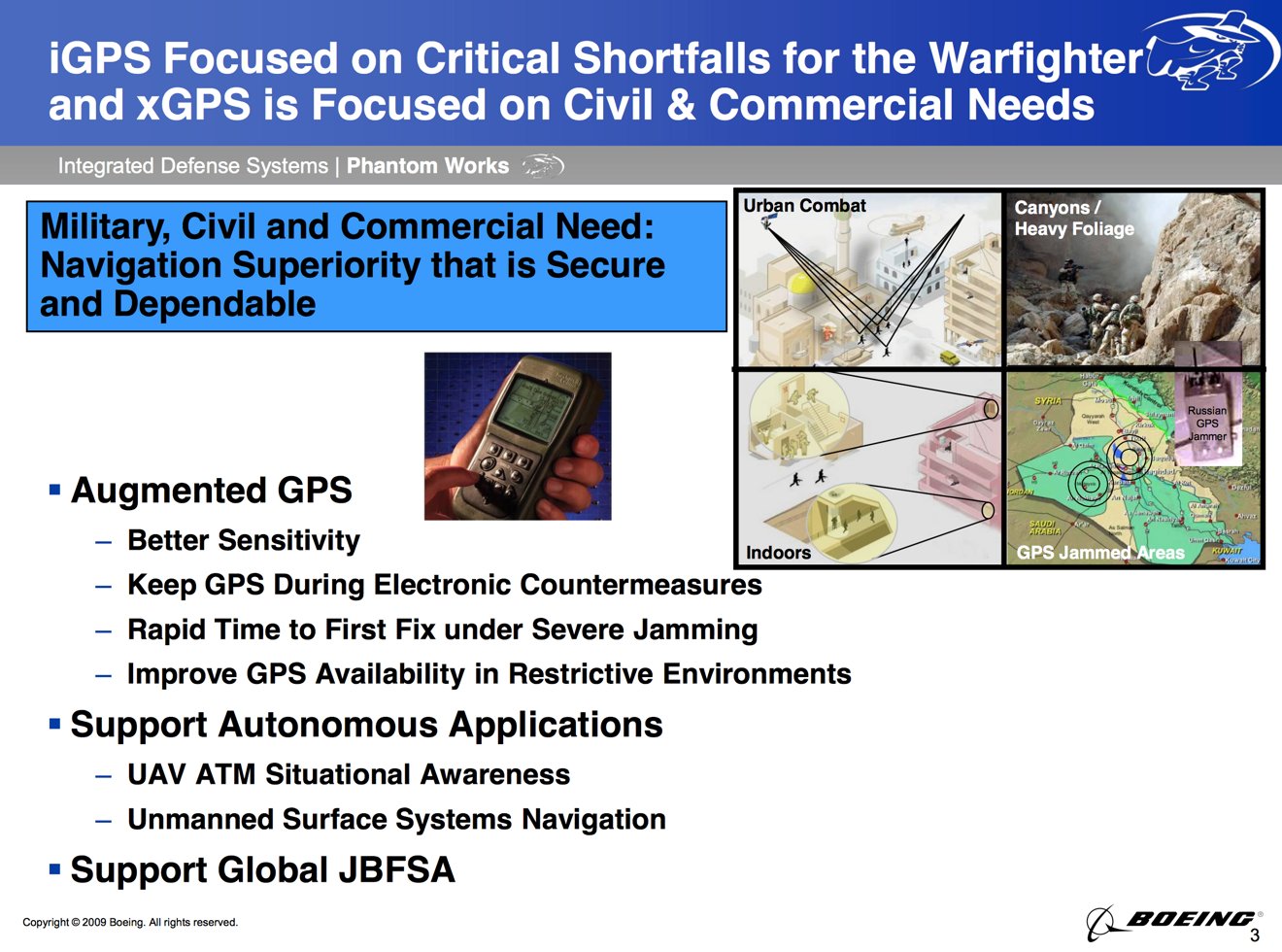Apple's recent acquisition of Coherent Navigation, a California firm that worked on high-precision satellite navigation projects for the likes of the U.S. Navy, might at first seem a bit outside of the iPhone maker's wheelhouse. But a closer look reveals what could, in fact, be an excellent match.
As a company, Coherent Navigation is typical of small startups that do high-value research and development. It was founded by subject-matter experts from Stanford and Cornell, carries just a handful of full-time staff, and appears to have been primarily engaged in projects funded by the U.S. Department of Defense.
In a slide from a presentation given at Stanford's 2009 Position, Navigation, and Time symposium, Coherent employees described the company as pioneering "advanced positioning, navigation, timing, and communication (PNT+C) solutions for government and civilian market." They touted improvements in accuracy, availability, integrity, and jam resistance that could be gained from Coherent's technology.
Coherent's primary claim to (public) fame was its work on High-Integrity GPS, or "iGPS." That program, initiated by the Naval Research Laboratory, sought to improve the reliability of military GPS units by co-processing signals from the Navstar GPS satellite network with signals from the underutilized Iridium communications constellation.
A subsequent presentation from Boeing's Phantom Works division posited that a single Iridium satellite could be used as the equivalent of two "static" GPS satellites.
According to Boeing, the result would be centimeter-level accuracy, the ability to acquire a position fix in only a few seconds — Â compared to as long as 40 seconds for traditional GPS, or even longer in poor conditions — and greater resistance to active and passive signal jamming.
A side benefit of the increased sensitivity of iGPS is the ability to use GPS effectively in environments where it doesn't currently work very well: situations where the user is surrounded by tall buildings, under heavy foliage, in a canyon or ravine, or even indoors.
Similar satellite-based augmentation systems (SBAS) have been in place for years, primarily to serve the civil aviation sector. Airline pilots flying in North America can use the Wide Area Augmentation System (WAAS), which was developed by the FAA, for high-precision positioning in every phase of flight - even depending on it for landings.
SBAS programs like WAAS are imperfect, however. They generally depend on a large network of ground stations in addition to satellites, and are ill-suited for non-aviation applications.
iGPS wouldn't have those limitations, but it's unlikely to ever be offered for civilian use. Since Apple isn't a military contractor, what might they be looking for by acquiring Coherent?
In a word, expertise.
Improved positioning technology could have a wide-ranging impact across all of Apple's product lines.
Apple already augments the built-in GPS on its devices in a number of ways. Wi-Fi positioning, tower multilateration, inertial navigation, and A-GPS are all in the company's arsenal.
Unfortunately, anyone who has ever tried to track their route through midtown Manhattan using iOS location services knows that there's room for improvement.
This is where Coherent's team can contribute. Their extensive experience in building more accurate positioning systems could prove invaluable as Apple works to improve its mapping services — Â and not just the user-facing portions.
Apple's army of vans points to a wide-ranging effort to produce high-resolution geospatial data. Combined with ultra-accurate positioning, that could be a significant advantage for the company's rumored self-driving car project.
Of course, it's also possible that Coherent had pivoted to develop some new technology that it had yet to publicly reveal. Before it was pulled down last month, Coherent's website said that the firm was "working on high-precision GPS solutions that work with the Iridium [sic]," but was only offering current products to the U.S. government and its allies.
In short, this looks like a prototypical Apple acquisition: a small company with a smart, well-respected team built around an impressive core technology that will likely form the anonymous foundation of a still-unknown product.
 Sam Oliver
Sam Oliver








-m.jpg)






 Marko Zivkovic
Marko Zivkovic
 Christine McKee
Christine McKee
 Andrew Orr
Andrew Orr
 Andrew O'Hara
Andrew O'Hara
 William Gallagher
William Gallagher

 Mike Wuerthele
Mike Wuerthele
 Bon Adamson
Bon Adamson




-m.jpg)



30 Comments
Can it help Apple finally fix iCloud? I cannot for the life of me figure out why Apple cannot fix the miserable design and execution of iCloud for the users.
The value of DARPA-funding for some of these projects should not be underestimated. I know some folks complain about military projects but they can also lead to valuable consumer uses, SIRi, Boston Dynamics, and Coherant among them as examples of DARPA investments. The US government sometimes helps even us little guys, even tho that might not have been the focus. :D
Apple is NOT building a self-driving car. They don't follow Google- they lead. Apple never has and never will copy Google- they will leapfrog them. Wait and see...
Apple is NOT building a self-driving car. They don't follow Google- they lead. Apple never has and never will copy Google- they will leapfrog them. Wait and see...
Apple is NOT building a self-driving car. They don't follow Google- they lead. Apple never has and never will copy Google- they will leapfrog them. Wait and see...
Of greatest interest to me is what Google, IBM, Apple, Amazon and Facebook end up doing with artificial intelligence. Things are going to get really interesting, really fast over the next 5-10 years.